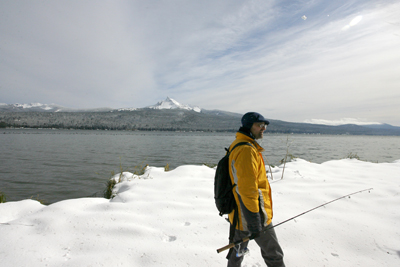|
'Gem of the Cascades' regaining some of its luster
 |
Zach Urness/Daily Courier
Diamond Lake has seen its fishing improve greatly this past year. |
The fishing at Diamond Lake was outstanding in 2010, and has shown the ability to rebound from the years that it was plagued by blue-green algae and invasive species. o o o oBy Zach Urness of the Daily CourierDIAMOND LAKE -- The flakes of snow drifted lightly downward from the mottled gray sky, down into the frosted white bowl between Mount Thielsen and Bailey, and it melted on the water's surface alongside my boat.I wore a parka and snow pants, a knit hat over my head and gloves on my hands, as I casted a treble hook rigged with neon pink PowerBait out into the depths. The pink spec disappeared into the aluminum sheet of water, and between sips of coffee, I waited for that electric shock through my fishing rod that would alert me to the interest of a local trout. This past week I took two trips to Diamond Lake — the final days of a fishing season that ended Monday — for one last shot at the lake's famously thick fish. The weather was ugly, blowing a mixture of sleet, snow and rain across the High Cascades while coating the lightening rod spike of Mount Thielsen (9,184 feet) with enough powder for skiing. But in a lake where 22-inch trout patrol the shorelines, and catching your limit isn’t far from the norm, fishing in the snow was a small price to pay. Because by most accounts, Diamond Lake was on fire this season. Umpqua District Fish Biologist Laura Jackson said that anglers caught 3.4 fish per day and that more than 103,000 trout were harvested. “The fishing was really good, better than we could have hoped,” said Steve Koch, the president and general manager of Diamond Lake Resort. “It’s almost sad to see it end.” The seemingly endless amount of fish hoisted from the water is enough to make you forget, just for a moment, that the so-called “Gem of the Cascades” has been witness to an almost Shakespearian drama the past 20 years. Toxic blooms of blue-green algae plagued the lake through the 1990s, annually causing bans that prohibited swimming, water-skiing and wading activities. By 2006, the lake’s ecosystem was almost completely demolished due in large part to an invasive species called the “tui chub” that multiplied to a population larger than 100 million and turned the water into a toxic, pea green soup. It got so bad in 2006, the drastic step of poisoning the lake with rotenone was taken. For the most part, the treatment has been a success. Trout were restocked and have began to make the lake their own again. Fishing has gradually improved with this year being characterized as the best yet. “This year has seen nearly double the annual harvest in the years following the 2006 rotenone treatment,” Jackson said. “Lots of the Eagle Lake rainbows, which are very nice fish, (were) caught.” It hasn’t always been the smoothest path, however. In July 2008, golden shiners -- which are illegal for anglers to use -- were discovered in the lake, creating such violent anger that the Oregon State Police were called in to conduct a criminal investigation. While the idea of police determining which anglers used illegal bait sounded a little bit like an episode of “CSI: Southern Oregon,” it was not a subject taken lightly. “I’m so frustrated by the whole thing I can hardly take a breath,” said Dave Loomis, the project manager for the Joe Merchep Umpqua River Foundation, when news broke. “I just cannot believe someone would do this.” This summer also brought a dose of frustration. For the first time since 2006, a blue-green algae advisory was placed on the lake’s south side from July 15 to Aug. 3. The algae was by no means unique to Diamond Lake, and health was restored quickly enough for some to dismiss it as an isolated incident, but it did raise questions as to whether future problems are inevitable. The only thing everyone agrees on at the moment is that the trout are back in a big way, and that Diamond Lake has returned to its place as one of the state’s best fisheries. “I think it shows that man can do something right, because we’ve restored an incredible fishery here,” Koch said. “There were a lot of nay-sayers who said we shouldn’t do it, and that it would never work. I wish those people could have seen all the families we’ve had here, who have big smiles on their faces from all the fish they’ve caught.”
| 




